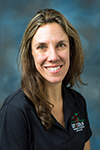The society grants this honor to a current APS member in recognition of distinguished contributions to plant pathology or to The American Phytopathological Society. Fellow recognition is based on significant contributions in one or more of the following areas: original research, teaching, administration, professional and public service, and/or extension and outreach.
 Natália A. Peres
Natália A. Peres
Gulf Coast Research and Education Center
University of Florida
Natália A. Peres was born in Santos, São Paulo, Brazil, and received her PhD in plant pathology from São Paulo State University in 2002. She was appointed assistant professor of plant pathology at the University of Florida, Department of Plant Pathology and the Gulf Coast Research and Education Center (UFL-GCREC), in 2004, and was promoted to associate professor in 2010, and professor in 2016.
The primary focus of her work at UFL-GCREC is on fungal diseases of strawberry. Peres runs an internationally recognized program and has one of the most productive and authoritative research programs today. The subtropical climate and intensive production systems of Florida present daunting disease management challenges to growers across a broad spectrum of pathosystems. Peres has systematically addressed their short-term needs and has taken the time to develop long-term strategies that underlie many of the short-term problems. She received the APS Hewitt Award in 2007 for excellence in applied research. In 2014, she received the APS Lee M. Hutchins Award for her research on fungicide resistance. Rather than shun routine efficacy testing of candidate fungicides, she has instead used this opportunity to confirm performance, and has developed innovative use patterns to prolong the effectiveness of fungicides that are at risk for pathogen resistance. This practical work has been undergirded by more fundamental and complementary studies of baseline sensitivity. She has published on the genetic basis of fungicide resistance, shifts in pathogen sensitivity and fitness under different management programs, information on sources of inoculum, and pathogen ecology, leading to the development of new management schemes. Her early recognition of the link between fungicide performance in fruit production fields and the use of at-risk fungicides in strawberry nursery plant production led to a comprehensive effort to integrate the disease management programs of the nursery plant industry with those of fruit producers. Peres and her colleagues have explored and developed innovative approaches to reduce or eliminate nursery selection for fungicide resistance, as well as provide effective suppression of pathogens for which there are few chemical or host resistance options including precision thermotherapy and field applications of UV light. This work has spanned diverse diseases including those caused by Colletotrichum species, Botrytis fruit rot, and powdery mildew as well as soil-borne diseases caused by species of Phytophthora and Macrophomina. Numerous examples of the foregoing have been seamlessly integrated within the extension and outreach program described below.
Peres's extension and outreach program has reduced the incidence of both chronic and acute catastrophic losses. This requires an emphasis on methods to identify the sources of each loss along with developing and implementing effective programs to address these losses. Prevention of chronic loss has been addressed through an extensive and effective educational effort through educational conferences and field days, and a steady output of useful, informative, and widely distributed articles in trade and professional journals and periodicals (more than 220 to date). Her efforts to avert catastrophic losses involve keen observation and intervention. She has actively collaborated with the strawberry breeding program and evaluated new cultivars to gauge the risks to growers before new cultivars are widely planted to commercial fruit production fields. The critical nature of this work cannot be overemphasized. Transplants for the predominant annual production systems for strawberry are produced in nurseries that are thousands of miles from Florida, under vastly different climatic conditions and disease risks. Integrated management programs are essential to lessening the risks of catastrophic losses to individual growers or across regions affecting many growers. In this regard, the development and refinement of the UFL Strawberry Advisory System (StAS) has extended a useful and now widely adopted tool for the industry; one that has reduced losses, improved control, and reduced the number of fungicide applications in low-risk seasons by up to 50%. The StAS continues to be improved with the addition of modules for new diseases and improvements in extant component models (Plant Health Progress 19: 182-187, Plant Dis. 101: 1910-1917). The high regard for her translation of applied research into high-impact outreach is reflected in the substantial grant support directed to her program from USDA programs such as SCRI, CPPM, and CAR: over $5,000,000 in awards since 2010.
Peres is a superbly gifted and dedicated mentor of undergraduate, graduate, and postgraduate researchers. Her excellence in this area has served to generate multipliers of her research and outreach effort. She has produced a generation of skilled and broadly trained researchers and crop advisors. Her commitment to mentor international students and postgraduate researchers is particularly notable. She has been an effective advocate of closer ties between the American Phytopathological Society and Brazilian Society of Plant Pathology and has been frequently engaged in these efforts by the leadership of APS. She has mentored 27 such undergraduate and 10 graduate and postgraduate researchers in her program since 2010. With Peres's support, the foregoing students have made 65 oral and poster presentations at APS national and regional meetings. During the same period, these students received 24 awards from APS Foundation, the University of Florida, and others, in recognition of their research and extension achievements, an incredible achievement in light of her off-campus responsibilities at UFL- GCREC. Peres has also served her profession through her engagement in APS, having served as associate and senior editors of Plant Disease; as the society representative to ICPP, as a coordinator and volunteer translator for the Portuguese language for the APS Education Center, and as the lead editor of the upcoming 3rd edition of the APS Compendium of Strawberry Diseases, Disorders, and Pests.
View additional APS Fellows
